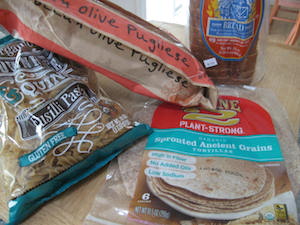
by plant4health | Mar 31, 2015 | Nutrition, Plant-based, Recipes, Vegan, WFPB, Whole food

Gluten-free has become a trendy buzzword among the health conscious. But is it right for everyone, even if you aren’t experiencing symptoms of having a gluten sensitivity?
What is gluten?
Gluten is a protein that naturally exists in wheat, rye, and barley and can be found in a variety of processed foods, including salad dressings and seasoning mixes. Gluten is also hiding in some vitamins, medications and makeup products. Gluten’s main claim to fame is its ability to help foods maintain its shape. That’s why it’s an essential part of baking. When combined with water, gluten’s strong, sticky protein gives structure to baked goods and pastas.
Gluten has become a popular meat substitute for vegans and vegetarians. High in protein, a four-ounce serving of seitan (a processed gluten meat substitute) contains about 26 grams of protein. Gluten is also low in fat and high in iron.(1)
When is gluten bad?
Gluten is harmful to people with celiac disease or a gluten sensitivity. When people with celiac disease (an autoimmune disorder) eat gluten it triggers an allergic reaction that results in inflammation and destruction to the lining of their small intestine and the malabsorption of nutrients. People with celiac disease tend to experience varying degrees of gastrointestinal issues, joint pain and skin rashes. In addition, studies have shown a link between celiac disease and neurological symptoms such as anxiety, depression, autism, epilepsy, and schizophrenia.(2) And there is strong evidence that individuals with autism, epilepsy, and schizophrenia all respond well to a gluten-free diet.(3) It only takes a very small amount of gluten (about 50 milligrams) to cause intestinal damage for a person with celiac disease. Learn more.
A related condition called gluten sensitivity or non-celiac gluten sensitivity can cause symptoms similar to celiac disease with an increase in the non-GI symptoms such as headaches, joint pain and numbness in the limbs and fingers. Individuals with gluten sensitivity lack the same antibodies as those with celiac disease and do not experience the same intestinal damage. Where celiac disease is considered an autoimmune disease, gluten sensitivity is an innate immune response where the immune system’s response does not target your own body’s tissues. (more…)
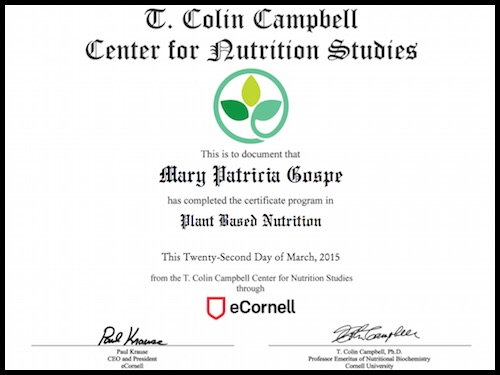
by plant4health | Mar 27, 2015 | Nutrition, Plant-based, WFPB, Whole food, plant-based
My sister-in-law, Kathy Parnay, and I co-founded Plant-based4health.com 3 months ago, in January 2015. Our goal was to share information on the benefits of a whole food plant-based (WFPB) diet. Her husband, Stefan, cured himself of aggressive prostate cancer on a low glycemic, alkalizing WFPB diet, so we had become believers in the healing power of food. I had already been a vegan since 2010 and a vegetarian for 18 years prior to that, so was eager to share tips and recipes with interested readers. Since that time, we have enjoyed a steady stream of global followers of our blog and “likes” on our Facebook page.
Wanting to learn more about plant-based nutrition to build my knowledge and credibility, I found the T. Colin Campbell Center for Nutrition Studies (CNS). CNS offers a six-week certification program in Plant-based Nutrition through Cornell’s online learning company, eCornell, so I quickly signed up.
I thoroughly enjoyed all the classes in the program. World-renowned experts Dr. T. Colin Campbell, Dr. Caldwell Esselstyn of The Cleveland Clinic and Dr. John McDougall of the McDougall Center and others deliver the lectures. Teacher’s Assistants (TAs) grade assignments, provide additional information and encourage discussion among the students. Topics include nutrition fundamentals, diseases of affluence (such as cancer, heart disease, Type 2 diabetes and more), understanding and interpreting scientific research, the role of supplements and the impact of food production on the environment. I am happy to report that I completed the classes and received my certificate this week!
More on Dr. Campbell and CNS:
T. Colin Campbell (M.S., Ph.D.) is the Jacob Gould Schurman Professor Emeritus of Nutritional Biochemistry in the Division of Nutritional Sciences at Cornell. He has spent his entire career studying the effects of nutrition on long-term health, conducting lab studies and large-scale human (epidemiological) studies. The co-author of the ground-breaking book, The China Study, along with Whole and Low Carb Fraud, his work was featured in the popular documentary Forks Over Knives.
I had the pleasure of interviewing Jenny Miller, Executive Director of CNS to learn more about the non-profit and the certification program. CNS was founded in 1997 by one of Dr. Campbell’s former students, Megan Murphy. The certificate program in plant-based nutrition offered through eCornell began in 2009. The program is one of the first offered and provides continuing medical education (CME) credits for health care professionals.
Over 6,000 students have completed the program with approximately 75% from the U.S. and the remaining in other countries, primarily Western Europe and Australia. Most students are heath care professionals, such as doctors, nurses and nutritionists, but there are many laypeople like myself – chefs, tech managers, accountants, etc. In the last year Ms. Miller has seen an increase in physicians and nurses taking the course, which she attributes to demand from patients.
CNS also launched a certification program called Nutrition for a Healthy Heart. Dr. Campbell’s son, and co-author of The China Study, Dr. Tom Campbell, just released a book called The Campbell Plan. His other son, Nelson Campbell, directed Plant Pure Nation, a documentary that will be released on July 4, 2015. Plant Pure Nation is currently running a Kickstarter campaign to raise money to get the documentary shown in as many venues as possible. Learn more and consider contributing.
In closing, it’s exciting to see that information on the health benefits of a WFPB lifestyle is gaining considerable attention among health care professionals and consumers. We are at a tipping point in changing the way people eat. A WFPB diet is healthier for us, healthier for our planet and better for the animals we no longer consume. Please join Kathy and me in spreading the word.

by plant4health | Mar 18, 2015 | Nutrition, Plant-based, Vegan, WFPB, Whole food, plant-based
Happy Spring! March 20 is the first day of Spring and since 1985 International Meatout day! People from around the world celebrate the season by going vegan for the day. Why? A whole food, plant-based vegan diet is healthy for humans, the planet and animals.
Here are three reasons to take the meatout pledge: (more…)

by plant4health | Mar 17, 2015 | grocery shopping, Nutrition, Plant-based, Recipes, Vegan, WFPB, Whole food
 It seems counter-intuitive that eating a healthy plant-based diet costs more then an unhealthy diet full of processed foods. Although cheaper in the short run, the cost savings of eating an unhealthy western American diet is countered as you age with the increase in health costs due to diabetes, heart disease, strokes, autoimmune diseases, and other chronic illnesses.
It seems counter-intuitive that eating a healthy plant-based diet costs more then an unhealthy diet full of processed foods. Although cheaper in the short run, the cost savings of eating an unhealthy western American diet is countered as you age with the increase in health costs due to diabetes, heart disease, strokes, autoimmune diseases, and other chronic illnesses.
But the immediate increase in costs of healthy organic foods can shock the pocketbook, making it a challenge for those living on a tight budget. When given the choice between a cheap, quick, heat and serve processed meal or a slightly more expensive, healthy, make it yourself meal that takes conscious effort, the cheap quick and easy usually wins out.
The good news is eating a plant-based vegan diet doesn’t have to break the bank. According to a study completed at the Harvard School of Public Health in 2013, it only costs about $1.50 more per person per day to eat healthy. It just takes a little strategy to shift your food choices and purchasing habits in order to keep the costs down. Here are some suggestions to help you save money: (more…)
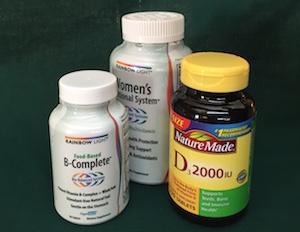
by plant4health | Mar 13, 2015 | Nutrition, Plant-based, Vegan, WFPB, Whole food, Whole food, plant-based
The vitamin supplement industry is a multibillion market – that’s billion, not million! Yet, according to Dr. T. Colin Campbell, “vitamin supplements are not a panacea for good health.” A whole food, plant-based (WFPB) diet plus adequate sunlight provides all the vitamins and minerals humans need with the exception of Vitamin B12 – which we’ll explore in this post. However, there are certainly cases where supplements are essential in the short term if you have a deficiency.
Nutrients in our food do not work in isolation but rather as a symphony. Taking a particular chemical nutrient out of context as a supplement doesn’t work for long-term health. And supplements for a single nutrient don’t always work the way the same nutrient present in natural foods do.
Beta Carotene & Vitamin E:
For example, there was a study in Finland where researchers followed cigarette smokers for 8 years. One group took supplements of alpha-tocopherol, a form of Vitamin E, another beta-carotene, another both supplements and another a placebo. The results were surprising. The group that took supplements had an increased lung cancer rate, while those on the placebo had a decreased lung cancer rate. Numerous other studies have found that supplements for Vitamins A & C, folic acid or antioxidants do not impact chronic diseases such as heart disease and cancer. (more…)
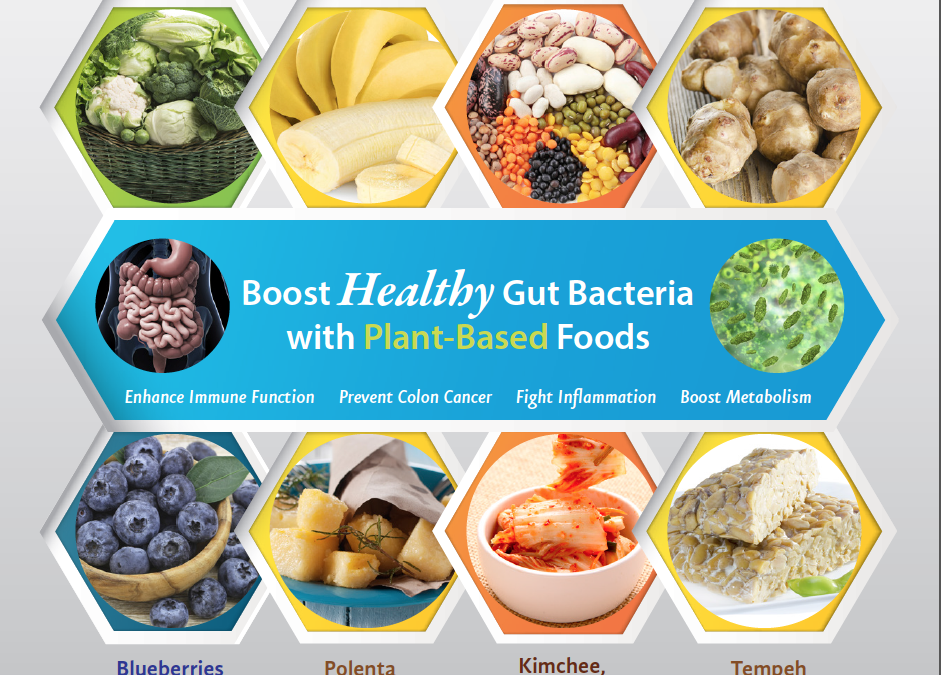
by plant4health | Mar 10, 2015 | Nutrition, Plant-based, Vegan, WFPB, Whole food, Whole food, plant-based
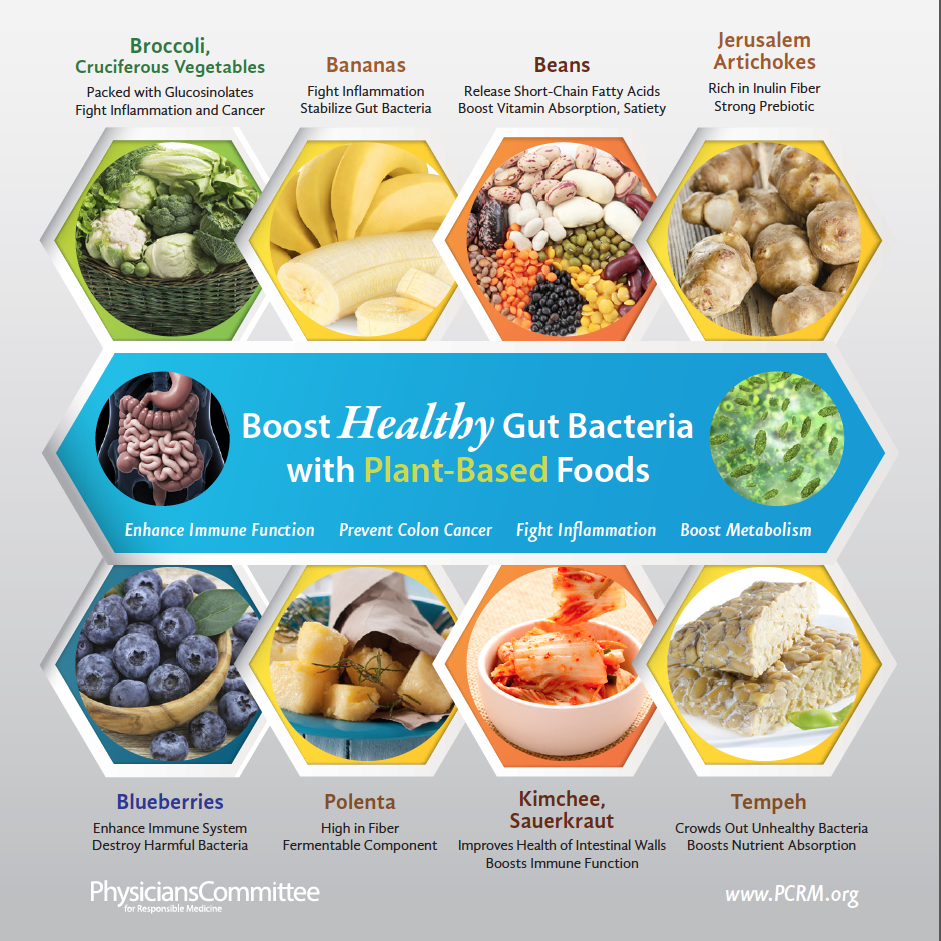
PCRM’s Infographic “Boost Healthy Gut Bacteria with Plant-Based Foods” www.pcrm.org
Your digestive system plays a crucial role in your healing process. This complex series of organs and glands break down the food you eat into nutrients that your body can absorb, using them to provide energy, heal and fight off disease. It then releases the toxic waste your body doesn’t need. As a result, it is essential for those with chronic illness and disease to pay close attention to their digestive health as a part of their healing process.
The foods you eat, your stress level and overall health all play a role in the effectiveness and health of your digestive system. This has been known since ancient times. The two oldest systems of medicine, traditional Chinese and Ayurveda, both focus on digestion as one of the key factors that influence heath, directing their healing efforts on the link between a person’s digestive system and their mental and physical well-being.
The biggest factors that contribute to poor digestion are:
- Chronic stress
- Diets low in fiber and high in processed foods, wheat, simple carbohydrates and sugars
- Chronic infections
- Antibiotics
- Non-steroidal anti-inflammatories (NSAIDs)
- Overuse of acid blockers (Prilosec, Nexium, etc)
- Low grade food allergies (dairy, eggs, corn)
Signs that your digestive system is out of balance:
- Gas
- Bloating
- Headache
- Burping
- Reflux
- Neck, shoulder, mid/lower back pain
- Fatigue following a meal
- Abdominal distention
- Constant hunger
- Bowel irregularity
Fortunately, there are several things you can do to bring your digestive system back into balance:
- Improve your gut flora: Your gut flora is made up of microorganisms that live in the digestive tracts and help your body digest and absorb nutrients and fight against intruders. Healthy flora is critical for whole body health. Your body cultivates new flora every 24 hours through the foods you eat. This healthy bacteria that lives in your intestinal tract thrives on colorful, plant-based foods such as cruciferous vegetables, bananas, beans, Jerusalem artichokes, blueberries, polenta, kimchee & sauerkraut and tempeh. PCRM has created a wonderful infographic that shows the properties of these foods that support healthy digestion titled Boost Healthy Gut Bacteria with Plant Based Foods. Learn more about how to restore your gut flora.
- Eat plenty of fiber – Fiber is important in maintaining regular bowel movements so toxins don’t build up and become reabsorbed into your body. Fiber is found in vegetables, fruits, grains and legumes. There are two kinds of fiber: Soluble fiber (i.e oatmeal, nuts, beans, apples and blueberries) slows down digestion as it breaks down into a gel in your intestines Insoluble fiber (i.e. seeds, grains, stringy parts or skins of plant matter) speeds up digestion as it passes through the body mostly intact . It is important to have both types of fiber in your diet.
- Drink plenty of water – water helps your body flush out toxins through your digestive system and softens stools. Fiber, like a sponge, absorbs water. A high fiber diet without enough fluid intake will cause constipation, resulting in the malabsorption of nutrients and the reabsorption of toxic waste that was delayed in being removed from the body.
- Manage your stress – when under stress, your body experiences the “flight or fight” response causing your central nervous system to shut down blood flow, this affects the contractions of your digestive muscles and decreases secretions needed for digestion. Stress can also result in inflammation of the gastrointestinal system. Some useful tools for distressing are: exercise, yoga, meditation, visualizations, deep breathing, spending time with friends or family, laughter, or communing with nature. Find what works for you. It can be as simple of learning to give yourself a “time out” when feeling overwhelmed to scheduling “me” time everyday to enjoy an activity you love. Learn more about stress and digestion.
- Exercise regularly – Aerobic exercise increases your breathing and heart rate, helping to stimulate the natural contraction of intestinal muscles. This doesn’t mean you should perform aerobic exercise after a large meal. Because digestion requires a large amount of blood flow, strenuous exercise right after a meal will stop digestion by redirecting the blood flow to support the increased need for physical activity. Instead, consider enjoying a slow leisurely walk which can actually stimulate digestion and relieve bloating.
- Take time to enjoy the your meal – When you eat too quickly your food is not broken down as well by chewing and the acid-neutralizing saliva that helps the food pass into your stomach is significantly diminished. This creates the perfect environment for heartburn and indigestion. Lingering over a meal with friends and family, chewing carefully and eating mindfully are important steps in creating healthy digestion.
- Sip on ginger tea. Ginger’s ability to relax the intestine muscles has made it a popular cure for stomach issues. However, it does so much more. According to the Chopra Addiction and Wellness Center, “a recent study in the European Journal of Gastroenterology and Hepatology found that ginger stimulates digestion by speeding up the movement of food from the stomach into the small intestine, and helps eliminates digestive discomfort after eating. In addition, ginger can stimulate saliva, bile, and gastric enzymes to aid in digestion of the food that has been ingested. “ They suggest drinking ginger tea regularly throughout the day by adding one teaspoon of grated or sliced fresh ginger root to a cup of hot water.
If you want to learn more, check out these articles:







